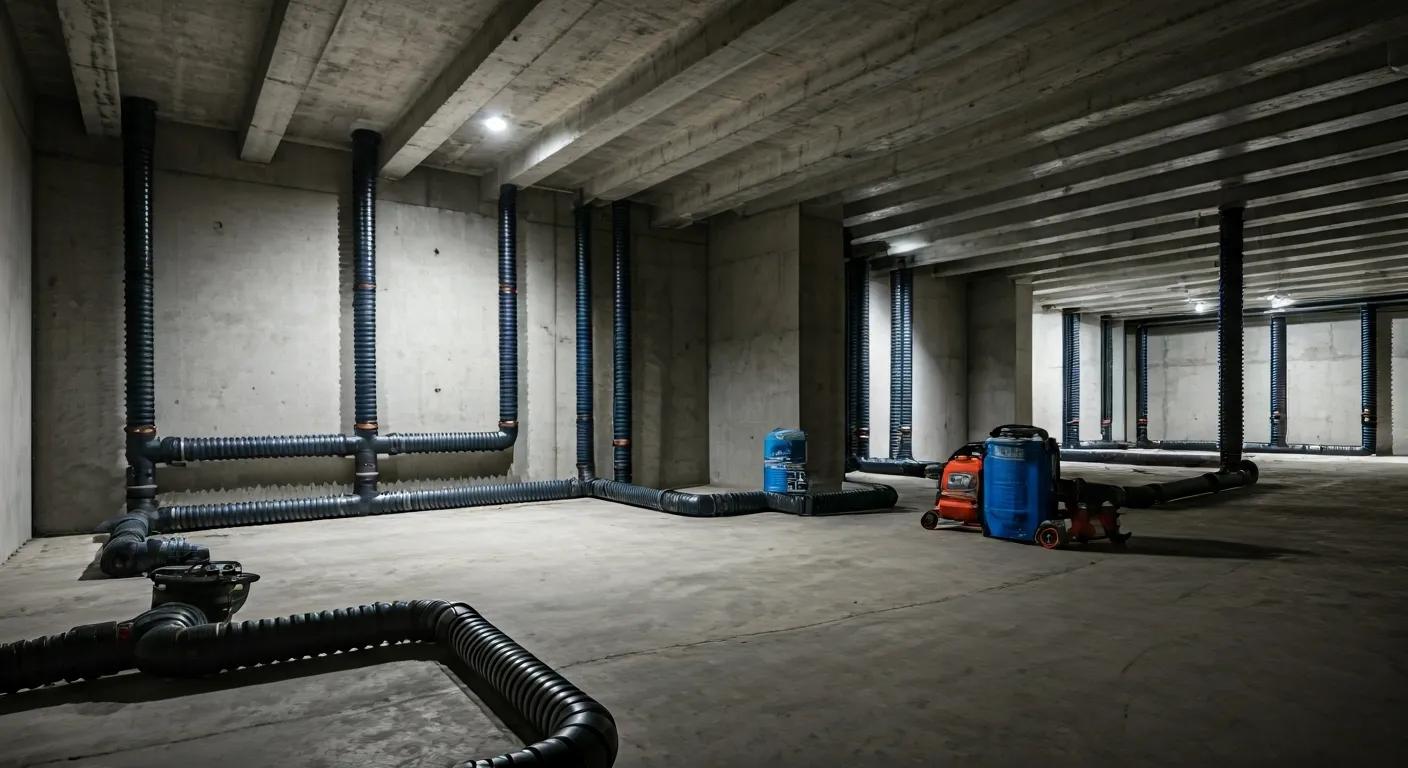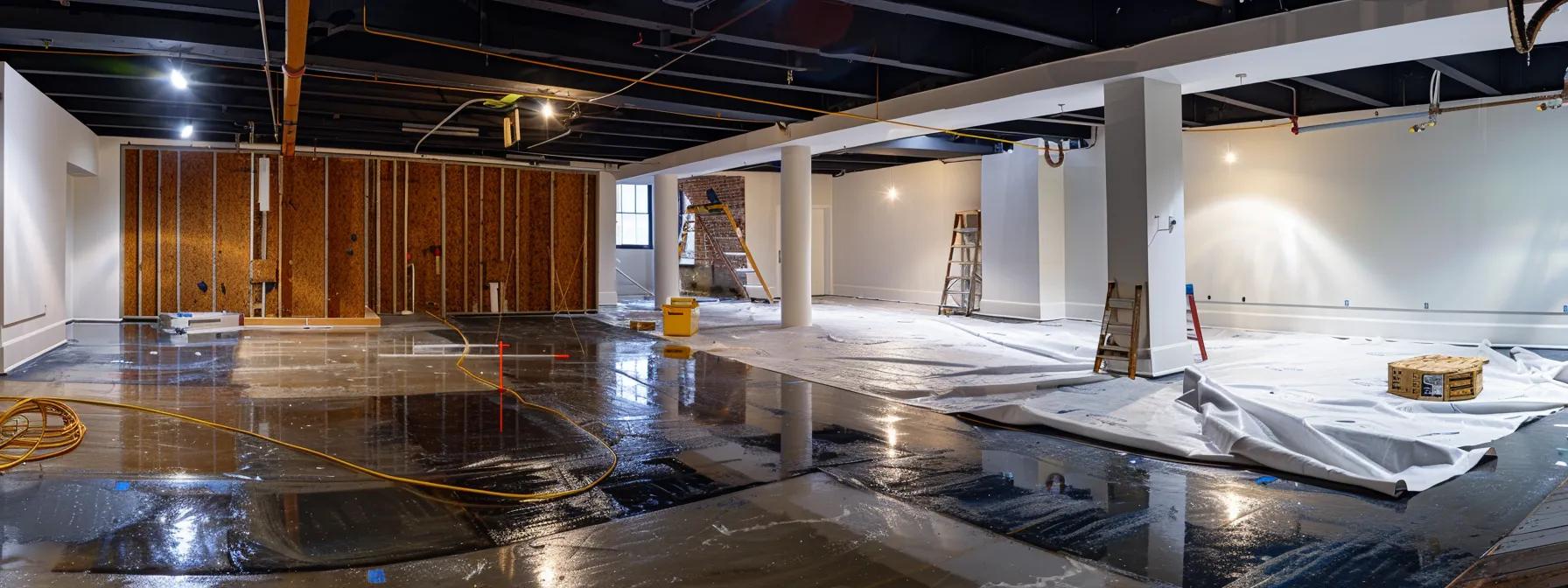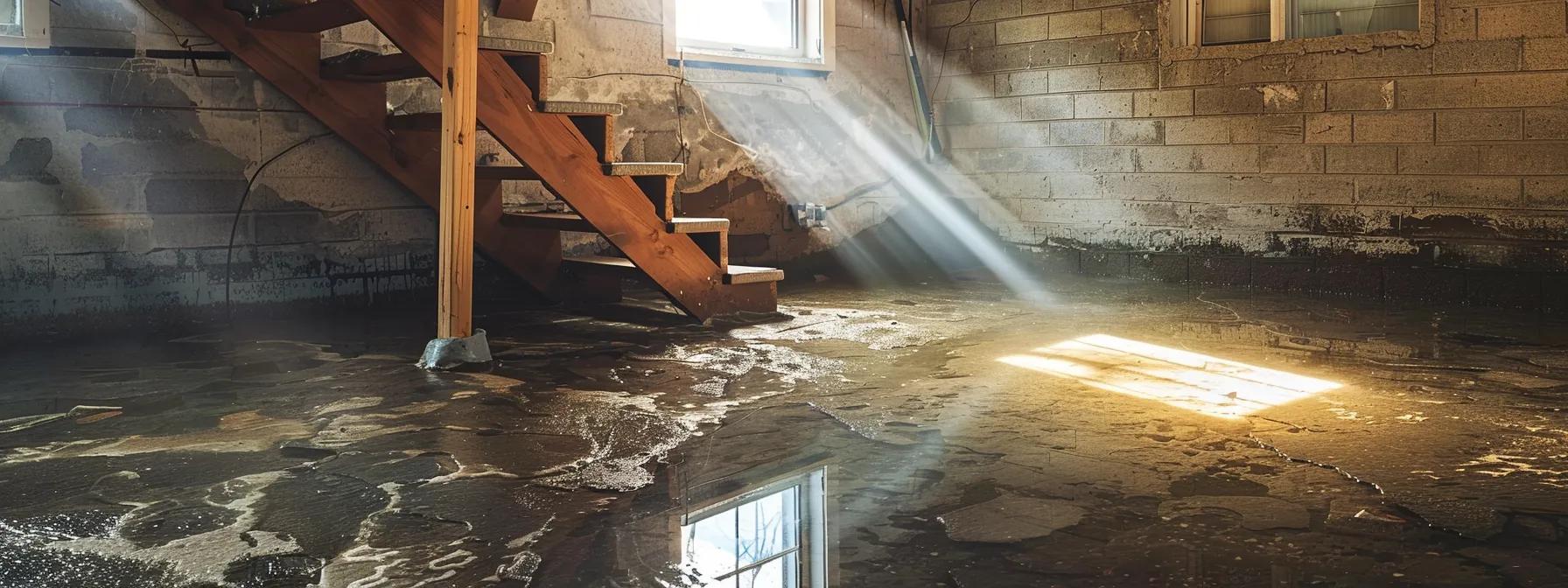How to Choose the Right Basement Waterproofing Solution
Basement waterproofing is critical for maintaining the structural integrity and safety of a home or commercial building. When moisture infiltrates a basement, it can lead to mold, foundation damage, unpleasant odors, and deterioration of building materials. At APW Basement Waterproofing, we believe the right solution is about protecting your investment and ensuring a basement dry, healthy environment. In this article, we explain common causes of basement water problems, the available basement waterproofing solutions, and the key factors you should consider when making your decision. Our goal is to guide you through every stage—from assessing water intrusion issues to choosing between interior and exterior solutions and finalizing installation—using proven, professional techniques.
What Are the Common Causes of Basement Water Problems?
Basement water issues most often result from external water pressure during heavy rains or rapid snowmelt, high water tables, poor drainage, and cracks in foundation walls or the concrete slab. These factors create conditions in which moisture can seep through tiny gaps or cracks, leading to dampness, mold growth, mildew, and even efflorescence on walls.
How Does Water Enter Basements?
Water typically infiltrates basements via capillary action along foundation walls or through joints and cracks caused by poor exterior sealants or faulty window and door fittings. Improper grading or pooling surface runoff can exacerbate infiltration, while groundwater pressure during rainstorms forces water into any available gap.
What Signs Indicate a Wet Basements?
Common signs of water intrusion include damp floors, water stains on walls, musty odors, and visible peeling paint or bubbling walls. Rusted metal supports and widened cracks are additional cues. Using a hygrometer to measure elevated humidity levels can confirm the extent of the moisture problem. Homeowners should also note sudden temperature changes that may worsen condensation.
Why Is Basement Waterproofing Important?
Water damage not only reduces property value but can also lead to significant repair costs over time. Effective waterproofing protects your foundation from constant water exposure, prevents mold and mildew, slows structural deterioration, and improves energy efficiency. Investing in our professional basement waterproofing Allentown ensures long-term protection and a dry, safe living space.
Which Types of Basement Waterproofing Solutions Are Available?

Choosing the right waterproofing method means understanding the available interior and exterior options, as well as supplementary systems like sump pumps and dehumidifiers. Each method addresses different aspects of water penetration and has its own advantages.
What Are Interior Waterproofing Methods?
Interior waterproofing focuses on managing moisture that has already entered the basement. One common method is installing an interior drainage system with perforated pipes along the perimeter to capture water and direct it to a sump pump. Applying interior sealants and epoxy coatings also helps block moisture from seeping through the concrete. Additionally, using dehumidifiers or specialized wall membranes reduces humidity, making this a cost-effective solution for moderate water issues, although it may not address structural problems.
How Do Exterior Waterproofing Systems Work?
Exterior waterproofing stops water before it reaches the interior by excavating around the foundation and applying a waterproof membrane or coating to the outer walls. Methods include bituminous membranes, polyurea coatings, or liquid-applied systems that form a continuous barrier. Often combined with french drains to divert water away from the foundation, exterior waterproofing offers long-lasting protection and addresses issues related to improper grading and poor drainage. This method is most effective for homes in areas with high water tables or severe weather conditions, though it is more invasive.
When Should You Use Sump Pumps and Dehumidifiers?
Sump pumps and dehumidifiers are essential components of a comprehensive basement waterproofing systems system. Sump pumps, installed in strategically located pits, automatically remove collected water—especially critical during heavy rains. Dehumidifiers remove excess airborne moisture, reducing the risk of mold growth and material deterioration. Even after the main waterproofing is in place, these devices help maintain consistently dry conditions in the basement.
What Are Crack Repair Kits and Their Benefits?
Crack repair kits, which use epoxy or polyurethane injections, are designed to seal small to moderate cracks in basement walls or floors. By closing these gaps, the kits not only stop water penetration but also reinforce the structural integrity of the wall. While a cost-effective interim solution, crack repair may require professional assessment to ensure that underlying issues are addressed.
How Do You Assess Your Basement’s Waterproofing Needs?
Choosing the right solution begins with a thorough assessment of your basement’s condition. This includes evaluating the extent of water intrusion, the condition of the foundation, and external factors like drainage and weather patterns.
What Factors Affect Basement Waterproofing Choices?
The foundation’s age and condition are crucial; older basements with visible cracks typically need more extensive solutions, while newer constructions might only require preventive measures. The frequency and severity of water intrusion help determine if an interior drainage or an exterior waterproofing system is more appropriate. Other factors include soil type, water table level, property slope, and the presence of any existing waterproofing measures. Accurate moisture measurements using a hygrometer further guide the decision-making process.
How Does BasementGuard Solutions Customize Waterproofing Plans?
At APW Basement Waterproofing, we start with a comprehensive inspection using advanced diagnostic tools. Our basement waterproofing Allentown team identifies whether the water intrusion arises from interior leaks, exterior pressure, or both, and then tailors a waterproofing plan accordingly. We perform a careful cost-benefit analysis, considering installation logistics, accessibility, and any potential disruptions, to ensure your waterproofing solution delivers long-term value.
When Is a Professional Inspection Necessary?
Minor water issues might be managed by homeowners, but persistent dampness, mold growth, or structural cracks require the expertise of professionals. A licensed contractor can accurately diagnose water problems and recommend targeted solutions. Professional inspections also reveal hidden issues like inadequate drainage or subtle foundation cracks that might otherwise go unnoticed.
What Are the Key Features to Look for in Waterproofing Products and Services?

When selecting waterproofing products or services, long-term reliability and quality customer support are as important as the technical specifications.
How Important Is Warranty Coverage?
A robust warranty is a key indicator of a contractor’s confidence in their work. Long-term warranties, which may extend several years or even a lifetime, protect homeowners from unforeseen issues. Always review the warranty details to understand what materials and installation aspects are covered and under which conditions the warranty might be voided.
Why Choose Certified Technicians for Installation?
Certified technicians ensure proper installation and adherence to industry standards. At APW Basement Waterproofing, our technicians are continuously trained on the latest basement waterproofing Allentown techniques, reducing the risk of errors and ensuring durable performance. Hiring certified professionals also brings the added benefit of liability insurance for extra protection.
What Role Does Customer Education Play in Choosing Solutions?
We believe that well-informed homeowners are better equipped to make decisions that protect their property. That’s why we offer workshops, detailed brochures, and one-on-one consultations that explain the waterproofing process, product benefits, and maintenance requirements. Educated customers are more likely to follow care instructions and perform basic maintenance, which helps maintain the effectiveness of the waterproofing system.
Below is a table comparing key waterproofing features:
How Much Does Basement Waterproofing Cost and What Are Financing Options?
Basement waterproofing costs vary widely based on water damage extent, method used, and specific property conditions. Understanding these cost factors helps homeowners plan their investment efficiently.
What Factors Influence Waterproofing Costs?
Key cost drivers include the severity of water intrusion, basement size, and work complexity—such as the need for excavation or specialized equipment. Other factors include material quality, labor costs, and geographic considerations such as regional labor rates. Comparing detailed quotes from multiple professionals can help identify the best quality-to-cost ratio.
Are There Financing or Warranty Plans Available?
Many contractors, including APW Basement Waterproofing, offer financing and flexible payment plans to ease the financial burden. Options such as low-interest loans and extended payment plans are available. A comprehensive warranty often accompanies our services, acting as a form of insurance against future issues and unexpected costs.
Below is a summary table of typical cost ranges:
How Can You Maintain Your Basement After Waterproofing?

Waterproofing is only the first step; ongoing maintenance is crucial to prevent future water damage and ensure lasting protection.
What Regular Maintenance Prevents Water Damage?
Regular tasks include cleaning gutters to prevent debris buildup, ensuring proper landscape grading, and performing routine inspections for new water stains or cracks. Additionally, cleaning drainage systems and sump pump pits and testing pump operation at least once a year—ideally before the rainy season—can help avoid major issues.
We recommend a maintenance checklist that covers cleaning, visual inspections, and minor repairs to detect problems early before they lead to extensive damage.
How Do Dehumidifiers Help Long-Term Basement Health?
Dehumidifiers maintain indoor humidity below 50 percent, reducing the risk of mold, mildew, and deterioration of building materials. Regular operation and proper ventilation further enhance indoor air quality and comfort. For optimal performance, dehumidifier capacity should match your basement’s size, and filters should be cleaned on a regular schedule.
When Should You Schedule Follow-Up Inspections?
Regular professional inspections—every one to two years—help ensure your waterproofing system remains effective. These inspections check for wear, degradation, or any new signs of water intrusion. In addition to professional check-ups, homeowners should periodically inspect seams, cracks, and drainage systems to maintain a dry and secure basement.
What Are Homeowners’ Frequently Asked Questions About Basement Waterproofing?
Homeowners often have questions about the waterproofing process. Below are answers to some frequently asked questions.
How Long Does Basement Waterproofing Last?
The lifespan of waterproofing systems depends on the method, materials, and maintenance. Exterior systems typically last 15 to 30 years, while interior solutions may need updates every 10 to 15 years. Regular maintenance and inspections are crucial for extending system durability. At APW Basement Waterproofing, we back our work with comprehensive warranties.
Can Basement Waterproofing Increase Home Value?
Yes, a dry and well-maintained basement adds to a property’s market value by reducing the risk of future repairs and mold issues. A properly waterproofed basement is attractive to buyers and can contribute positively to appraisal values.
What Are the Most Effective Waterproofing Solutions for Different Basement Types?
The ideal solution depends on your basement’s condition. Minor dampness may be best addressed with interior drainage and dehumidifiers, while older basements with significant cracks often require exterior membrane applications or a sump pump system. We tailor our recommendations based on a complete assessment of your property.
How Often Should Maintenance Be Performed on a Waterproofed Basement?
We suggest scheduling a professional inspection every one to two years, along with seasonal tasks like cleaning gutters and checking sump pumps and humidity levels. This proactive approach helps prevent potential issues from developing into bigger problems.
Is It Possible to Waterproof Basement That Has Already Suffered from Water Damage?
Yes, but the process can be more complex. The basement must first be thoroughly dried and any structural repairs or mold remediation completed. Once the preliminary work is done, a suitable waterproofing system can be installed to protect against future issues.
Frequently Asked Questions
Q: What are the most common early signs of basement water problems? A: Early signs include damp or musty odors, water stains on walls or floors, peeling paint, and slight rust on metal. These indicators should prompt a professional inspection before damage worsens.
Q: How long does it typically take to complete a comprehensive waterproofing project? A: The timeframe depends on the method and extent of repairs. Interior systems may be completed in a few days, while extensive exterior waterproofing that involves excavation can take several weeks.
Q: Can I install waterproofing products myself, or is professional installation recommended? A: Although minor repairs can be DIY projects, professional installation is recommended for lasting effectiveness. Certified technicians ensure proper application and provide warranties that DIY methods cannot match.
Q: How do financing options work for waterproofing projects? A: Many companies, including APW Basement Waterproofing, offer financing options such as low-interest loans and installment plans to spread out the cost, making large projects more affordable.
Q: Are there any restrictions on waterproofing methods for basements with unique layouts? A: Every basement is unique. Unusual shapes, multiple levels, or challenging access points may affect the choice of waterproofing solution. A personalized assessment ensures that the chosen method adapts to your space.
In summary, choosing the right basement waterproofing Allentown solution depends on a clear understanding of your property’s specific challenges and long-term requirements. We at APW Basement Waterproofing are dedicated to delivering comprehensive assessments, tailored recommendations, and high-quality installations to keep your basement safe, dry, and valuable for years to come.
